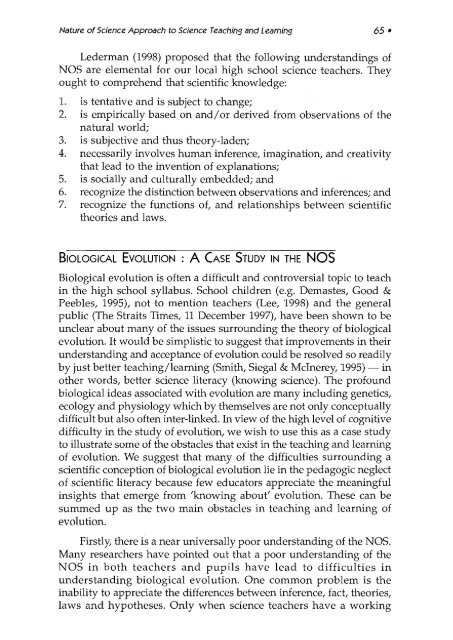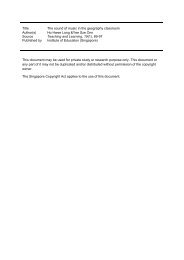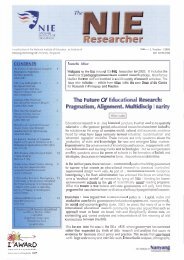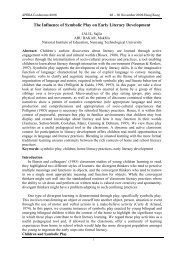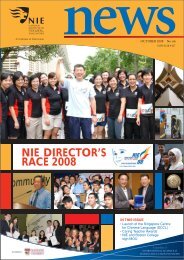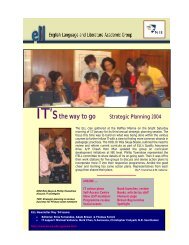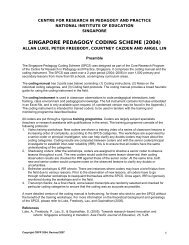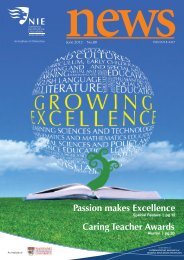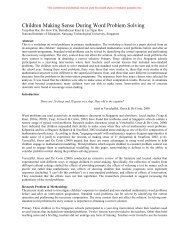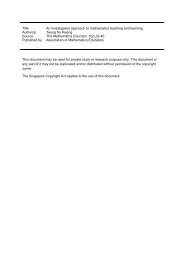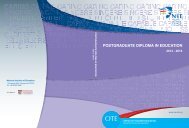Title Nature of Science Approach to Science Teaching and Learning ...
Title Nature of Science Approach to Science Teaching and Learning ...
Title Nature of Science Approach to Science Teaching and Learning ...
Create successful ePaper yourself
Turn your PDF publications into a flip-book with our unique Google optimized e-Paper software.
<strong>Nature</strong> <strong>of</strong> <strong>Science</strong> <strong>Approach</strong> <strong>to</strong> <strong>Science</strong> <strong>Teaching</strong> <strong>and</strong> <strong>Learning</strong> 65Lederman (1998) proposed that the following underst<strong>and</strong>ings <strong>of</strong>NOS are elemental for our local high school science teachers. Theyought <strong>to</strong> comprehend that scientific knowledge:1. is tentative <strong>and</strong> is subject <strong>to</strong> change;2. is empirically based on <strong>and</strong>/or derived from observations <strong>of</strong> thenatural world;3. is subjective <strong>and</strong> thus theory-laden;4. necessarily involves human inference, imagination, <strong>and</strong> creativitythat lead <strong>to</strong> the invention <strong>of</strong> explanations;5. is socially <strong>and</strong> culturally embedded; <strong>and</strong>6. recognize the distinction between observations <strong>and</strong> inferences; <strong>and</strong>7. recognize the functions <strong>of</strong>, <strong>and</strong> relationships between scientifictheories <strong>and</strong> laws.BIOLOGICAL EVOLU-[ION : A CASE STUDY IN THE NOSBiological evolution is <strong>of</strong>ten a difficult <strong>and</strong> controversial <strong>to</strong>pic <strong>to</strong> teachin the high school syllabus. School children (e.g. Demastes, Good &Peebles, 1995), not <strong>to</strong> mention teachers (Lee, 1998) <strong>and</strong> the generalpublic (The Straits Times, 11 December 1997), have been shown <strong>to</strong> beunclear about many <strong>of</strong> the issues surrounding the theory <strong>of</strong> biologicalevolution. It would be simplistic <strong>to</strong> suggest that improvements in theirunderst<strong>and</strong>ing <strong>and</strong> acceptance <strong>of</strong> evolution could be resolved so readilyby just better teaching/learning (Smith, Siegal & McInerey, 1995) - inother words, better science literacy (knowing science). The pr<strong>of</strong>oundbiological ideas associated with evolution are many including genetics,ecology <strong>and</strong> physiology which by themselves are not only conceptuallydifficult but also <strong>of</strong>ten inter-linked. In view <strong>of</strong> the high level <strong>of</strong> cognitivedifficulty in the study <strong>of</strong> evolution, we wish <strong>to</strong> use this as a case study<strong>to</strong> illustrate some <strong>of</strong> the obstacles that exist in the teaching <strong>and</strong> learning<strong>of</strong> evolution. We suggest that many <strong>of</strong> the difficulties surrounding ascientific conception <strong>of</strong> biological evolution lie in the pedagogic neglect<strong>of</strong> scientific literacy because few educa<strong>to</strong>rs appreciate the meaningfulinsights that emerge from 'knowing about' evolution. These can besummed up as the two main obstacles in teaching <strong>and</strong> learning <strong>of</strong>evolution.Firstly, there is a near universally poor underst<strong>and</strong>ing <strong>of</strong> the NOS.Many researchers have pointed out that a poor underst<strong>and</strong>ing <strong>of</strong> theNOS in both teachers <strong>and</strong> pupils have lead <strong>to</strong> difficulties inunderst<strong>and</strong>ing biological evolution. One common problem is theinability <strong>to</strong> appreciate the differences between inference, fact, theories,laws <strong>and</strong> hypotheses. Only when science teachers have a working


